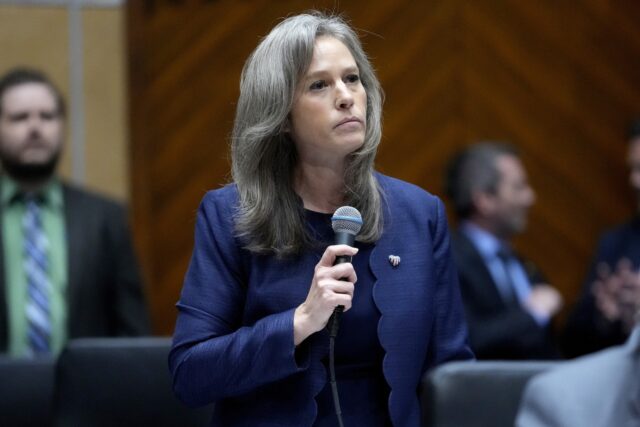Arizona Supreme Court Justice Clint Bolick sided with the majority in restoring an 1864 ban on nearly all abortions
An Arizona judge helped revive an 1864 abortion law. His lawmaker wife joined Democrats to repeal itBy RIO YAMATAssociated PressThe Associated Press
When it was Shawnna Bolick’s turn to speak, the words tumbled out of her for 20 minutes. The conservative lawmaker was in the middle of a heated debate in the Republican-led Arizona Senate on a bill to repeal an 1864 law banning nearly all abortions.
Democrats needed at least one more vote from the right to advance the bill.
Bolick, head hung low and tripping over her words, described her three difficult pregnancies, including one that ended in miscarriage. She said she wouldn’t have got through it “without the moral support of my husband.”
Her husband, Arizona Supreme Court Justice Clint Bolick, was part of the majority that voted in April to restore the near-total ban.
Observers in the gallery jeered as the senator declared herself “pro-life.” Only in the final moments of her speech did her intention become clear.
“I am here to protect more babies,” she said. “I vote aye.”
The bill passed and a day later, May 2, Democratic Gov. Katie Hobbs signed it into law.
Shawnna Bolick’s vote to repeal the near-total ban her spouse helped reinstate underscores the increasingly chaotic philosophical and legal landscape surrounding abortion access in Arizona, and it reflects national Republicans’ struggle to navigate the politics of abortion during a presidential election year.
This could spell trouble for the judge and the senator. Both declined interview requests from The Associated Press.
Shawnna and Clint Bolick met in Washington at an event hosted by the Heritage Foundation, a conservative research institute. They have long been friends with U.S. Supreme Court Justice Clarence Thomas — a godfather to one of Clint Bolick’s sons — and his conservative political activist wife, Ginni.
Clarence Thomas was part of the majority that overturned Roe v. Wade in 2022 — something he had sought for more than 30 years — and he also pressed his colleagues to reverse rulings protecting same-sex marriage, gay sex and the use of contraceptives.
After the 2020 presidential election, Ginni Thomas sent emails urging Republican lawmakers in Arizona — including Shawnna Bolick — to choose their own electors to undo Joe Biden’s victory in the state. Bolick, then a state representative, introduced a bill the following year to rewrite Arizona’s election laws to give state lawmakers the power to reject election results “at any time before the presidential inauguration.” Her proposal died before coming to a vote.
Their conservative credentials haven’t shielded them from criticism as Clint Bolick seeks another six-year term on the bench, and his wife, who was appointed last year to represent her northern Phoenix district, faces a primary challenge on July 30.
After the high court published its ruling, calls from the right to repeal the near-total ban quickly surfaced. On social media, U.S. Rep. David Schweikert, a Republican, said the court “legislated from the bench.” Former Republican Gov. Doug Ducey said the court’s ruling didn’t reflect “the will of the people.”
A progressive group also launched a campaign targeting Justices Bolick and Kathryn King — both of them voted to restore the 160-year-old abortion ban and are up for retention election in November.
“Arizonans have a constitutional right to hold judges and justices accountable,” said Abigail Jackson, digital coordinator for Progress Arizona. “So we want to let Arizonans know that these two particular justices will be on the ballot in November and to direct some of their energy towards unseating them.”
Voters rarely deny a sitting judge another term; only six have been unseated since Arizona adopted its judicial retention election system in 1974.
Democrats, meanwhile, have put the abortion ruling at the center of their quest to take control of the state Legislature for the first time in decades. Sen. Bolick, representing one of the most competitive districts in the state, is among their top targets.
Bolick appeared to argue on the floor that a repeal would guard against extreme ballot initiatives to enshrine abortion rights, saying she wanted “to protect our state constitution from unlimited abortions.”
But the Center for Arizona Policy, an anti-abortion advocacy group, blasted her vote to repeal, saying she “voted with pro-abortion activist lawmakers.”
Some Republican colleagues agreed.
“She has confused the pro-life community,” Sen. Jake Hoffman said on the floor after the vote. “Make no mistake, to everybody watching this and hearing my voice right now, and everyone who will hear it, she voted for abortions.”
The repeal bill won’t take effect until 90 days after the state’s legislative session ends, typically in June or July. The Civil War-era ban could meanwhile be enforced, but the high court on Monday issued a stay on its decision, making a 2022 statute banning abortions after 15 weeks Arizona’s prevailing abortion law.
But the legal landscape could change yet again if Arizona voters approve a ballot measure in November to enshrine abortion access up to 24 weeks of pregnancy in the state constitution. Organizers say they’ll submit more than enough signatures by the July 3 deadline.
___
Yamat reported from Las Vegas. Associated Press writers Jonathan J. Cooper and Anita Snow in Phoenix contributed to this report.

COMMENTS
Please let us know if you're having issues with commenting.